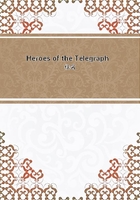
第16章
Among these claimants was Dr. Jackson, chemist and geologist, of Boston, who had been instrumental in evoking the idea of the telegraph in the mind of Morse on board the Sully. In a letter to the NEW YORKOBSERVER he went further than this, and claimed to be a joint inventor;but Morse indignantly repudiated the suggestion. He declared that his instrument was not mentioned either by him or Dr. Jackson at the time, and that they had made no experiments together. 'It is to Professor Gale that I am most of all indebted for substantial and effective aid in many of my experiments,' he said; 'but he prefers no claim of any kind.'
Morse and Smith arrived in London during the month of June.
Application was immediately made for a British patent, but Cooke and Wheatstone and Edward Davy, it seems, opposed it; and although Morse demonstrated that his was different from theirs, the patent was refused, owing to a prior publication in the London MECHANICS' MAGAZINE for February 18, 1838, in the form of an article quoted from Silliman's AMERICAN JOURNAL OF SCIENCE for October, 1837. Morse did not attempt to get this legal disqualification set aside. In France he was equally unfortunate. His instrument was exhibited by Arago at a meeting of the Institute, and praised by Humboldt and Gay-Lussac; but the French patent law requires the invention to be at work in France within two years, and when Morse arranged to erect a telegraph line on the St. Germain Railway, the Government declined to sanction it, on the plea that the telegraph must become a State monopoly.
All his efforts to introduce the invention into Europe were futile, and he returned disheartened to the United States on April 15, 1839.
While in Paris, he had met M. Daguerre, who, with M. Niepce, had just discovered the art of photography. The process was communicated to Morse, who, with Dr. Draper, fitted up a studio on the roof of the University, and took the first daguerreotypes in America.
The American Congress now seemed as indifferent to his inventions as the European governments. An exciting campaign for the presidency was at hand, and the proposed grant for the telegraph was forgotten. Mr.
Smith had returned to the political arena, and the Vails were under a financial cloud, so that Morse could expect no further aid from them.
The next two years were the darkest he had ever known. 'Porte Crayon'
tells us that he had little patronage as a professor, and at one time only three pupils besides himself. Crayon's fee of fifty dollars for the second quarter were overdue, owing to his remittance from home not arriving; and one day the professor said, 'Well, Strother, my boy, how are we off for money?' Strother explained how he was situated, and stated that he hoped to have the money next week.
'Next week!' repeated Morse. 'I shall be dead by that time . . . dead of starvation.'
'Would ten dollars be of any service?' inquired the student, both astonished and distressed.
'Ten dollars would save my life,' replied Morse; and Strother paid the money, which was all he owned. They dined together, and afterwards the professor remarked, 'This is my first meal for twenty-four hours.
Strother, don't be an artist. It means beggary. A house-dog lives better. The very sensitiveness that stimulates an artist to work keeps him alive to suffering.'
Towards the close of 1841 he wrote to Alfred Vail: 'I have not a cent in the world;' and to Mr. Smith about the same time he wrote: 'I find myself without sympathy or help from any who are associated with me, whose interests, one would think, would impell them at least to inquire if they could render some assistance. For nearly two years past I have devoted all my time and scanty means, living on a mere pittance, denying myself all pleasures, and even necessary food, that I might have a sum to put my telegraph into such a position before Congress as to insure success to the common enterprise. I am crushed for want of means, and means of so trifling a character too, that they who know how to ask (which I do not) could obtain in a few hours.... As it is, although everything is favourable, although I have no competition and no opposition--on the contrary, although every member of Congress, so far as I can learn, is favourable--yet I fear all will fail because I am too poor to risk the trifling expense which my journey and residence in Washington will occasion me. I WILL NOT RUN INTO DEBT, if I lose the whole matter. So unless I have the means from some source, I shall he compelled, however reluctantly, to leave it. No one call tell the days and months of anxiety and labour I have had in perfecting my telegraphic apparatus. For want of means I have been compelled to make with my own hands (and to labour for weeks) a piece of mechanism which could be made much better, and in a tenth part of the time, by a good mechanician, thus wasting time--time which I cannot recall, and which seems double-winged to me.
'"Hope deferred maketh the heart sick." It is true, and I have known the full meaning of it. Nothing but the consciousness that I have an invention which is to mark an era in human civilisation, and which is to contribute to the happiness of millions, would have sustained me through so many and such lengthened trials of patience in perfecting it.' Morse did not invent for money or scientific reputation; he believed himself the instrument of a great purpose.